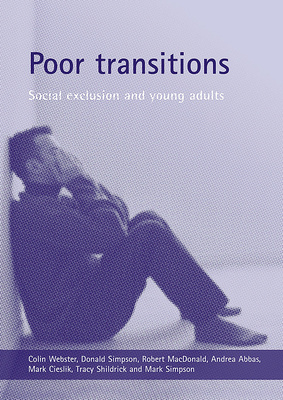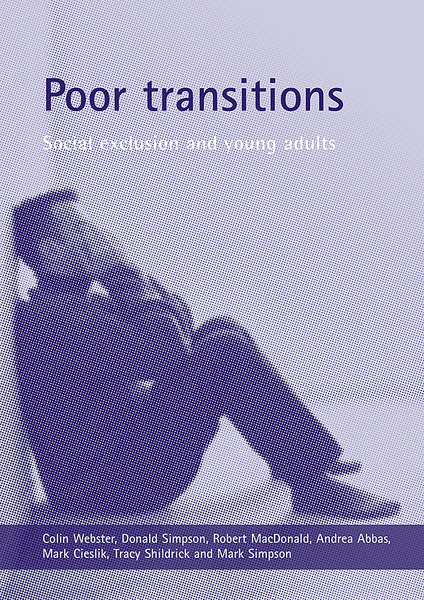Poor transitions
Social exclusion and young adults
By Colin Webster, Donald Simpson, Robert MacDonald, Andrea Abbas, Mark Cieslik, Tracy Shildrick and Mark Simpson
Published
Dec 8, 2004Page count
56 pagesISBN
978-1861346506Dimensions
297 x 210 mmImprint
Policy PressThis report provides a detailed picture of the processes that shape 'poor transitions'. The authors argue that understanding social exclusion and devising effective policies to reduce it requires immersion in the experiences of the socially excluded. Specifically, the report charts the longer-term transitions and outcomes of young adults who had grown up in a context of social exclusion as they reached their mid- to late-twenties; aids understanding of the key influences on social inclusion and exclusion for this age group; examines the young adults' extended participation in education, training and employment, their experiences of family life, and criminal and drug-using careers and draws out the implications for policy and practice interventions. Poor transitions is aimed at academics, policy makers, practitioners and general readers interested in an in-depth account of the biographical experiences of the socially excluded.
"... this report powerfully highlighted the voices and experiences of those living with the causes and consequences of social exclusion. In highlighting related policy implications the authors resisted an easy 'wish list' of reforms, instead questioning the appropriateness of a single 'employability agenda'. I found this a helpful and insightful, if painful, read and I would recommend it to others." Sociological Research Online
Colin Webster is Senior Lecturer in Criminology, Donald Simpson is a Researcher, Robert MacDonald is Professor of Sociology, Andrea Abbas, Mark Cieslik and Tracy Shildrick are Senior Lecturers in Sociology, and Mark Simpson is Principal Lecturer in Criminology. All work at the University of Teesside.
Introduction: 'Miserable measures': a profile of deprived neighbourhoods; Social exclusion and extended youth transitions; Research aims; Research methodology; Change and continuity in the extended transitions of socially excluded young adults: The 'education, training and employment' sub-sample; The 'family' sub-sample; The 'criminal and/or drug-using' sub-sample; Broader experiences of extended transitions: The persistence of poverty; Leaving home and social housing; Leisure careers: making the most of 'staying in'; Social networks: strong bonds but weak bridges; 'Critical moments': the unpredictable consequences of bereavement and ill-health; Summary and conclusions: Continuity and change in extended transitions; Social exclusion, poverty and social networks; De-industrialisation and the intergenerational experience of family disadvantage; Learning from more successful transitions? Implications for policy: The causes and effects of social exclusion; Principles and practice for tackling social exclusion; Extended, holistic and 'joined-up' policy or 'employability'? Area re-generation, social integration and the redistribution of wealth; Policy conclusions.









